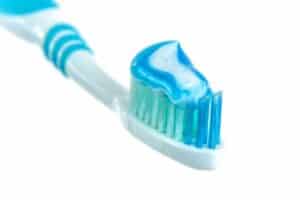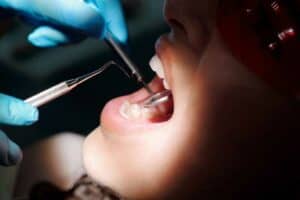
Help Keep an Oral Hygiene Routine
A consistent oral hygiene routine is the foundation of healthy teeth for everyone, including seniors. It’s important that seniors continue to keep an oral hygiene routine to remove plaque and bacteria that could lead to additional problems. Encourage seniors to brush their teeth at least twice a day using a soft-bristled toothbrush and fluoride toothpaste. Also, remind them to floss once a day. Flossing helps remove plaque and food particles from between the teeth that a toothbrush alone can’t reach. Keep in mind that some seniors may have physical limitations that prevent them from brushing or flossing properly. Your dentist in Ann Arbor can suggest alternative toothbrushes or flossers to make it easier.
Promote Regular Dental Check-ups
Regular dental check-ups are essential for seniors to monitor their oral health and address any issues early when they’re still easily treatable. Seniors should visit the dentist at least every six months for a thorough check-up and professional cleaning. Serious oral health problems such as gum disease or oral cancer can often be treated successfully when they’re caught in the early stages, which makes these appointments even more important.
Practice Proper Denture Care
Not all seniors will have dentures. But for those who do, practicing proper denture care is essential for maintaining oral health. Remind or help them to clean their dentures daily using a denture brush or a soft-bristled toothbrush and mild soap or denture cleanser. Dentures should be soaked overnight to maintain their shape so they continue to fit comfortably. However, outside of at-home denture care, regular dental check-ups are also important to evaluate fit and address any concerns or discomfort.
Encourage Good Habits
Everything from what we eat and drink to our activity level plays a role in our overall and oral health. Encourage seniors to engage in regular physical exercise, avoid smoking or excessive alcohol consumption, eat a variety of fruits, vegetables, whole grains, lean proteins, and dairy products, and drink plenty of water. These good habits can help support a healthy body, and a healthy body helps support healthy teeth and gums.
Keeping a senior’s teeth healthy requires a combination of consistent oral hygiene routines, proper denture care, a nutrient-rich diet, regular dental check-ups with their dentist in Ann Arbor, and overall health management. By implementing these essential tips, seniors can maintain a healthy smile, prevent dental issues, and improve their overall well-being. Supporting seniors in their oral care efforts and providing guidance is crucial in promoting healthy teeth and gums throughout their lives.
We have dental offices in Ann Arbor, Canton, Farmington Hills, and Livonia, and we’re always accepting new patients.

Causes of Sensitivity
Various different things can cause tooth sensitivity, such as:
Symptoms of Sensitivity
The primary symptom of tooth sensitivity is sharp, sudden pain when eating or drinking hot, cold, sweet, or acidic foods and beverages. Some people may also experience pain when brushing or flossing their teeth.
Treatment Options for Tooth Sensitivity
The treatment for tooth sensitivity will depend on the underlying cause. Here are some treatment options that may be recommended by your dentist in Livonia:
Preventing Tooth Sensitivity
Prevention is the best way to deal with tooth sensitivity. Here are some tips to help prevent tooth sensitivity:
Tooth sensitivity can greatly impact your daily life. That’s why we encourage anyone experiencing sensitivity to schedule an appointment with a dentist in Livonia. They can offer personalized treatment options to help you manage your tooth sensitivity and enjoy your favorite foods and drinks without pain.
Don’t let tooth sensitivity impact your daily life. Schedule an appointment with us today.
We have four dental offices in Ann Arbor, Canton, Farmington Hills, and Livonia.

Step 1: Medical History Review
At the beginning of your dental checkup, your dentist in Farmington Hills will review your medical history to gain a better understanding of any existing medical conditions or medications that may affect your dental health. This information will help us provide the best possible care for your individual needs.
Step 2: Visual Examination
Next, your dental team will perform a visual examination of your teeth and gums. They will look for any signs of tooth decay, gum disease, or other oral health issues. This is also a good opportunity to discuss any concerns or questions you may have about your dental health.
Step 3: X-rays
In some cases, your dental professional may recommend taking X-rays to get a more detailed look at your teeth and jawbone. X-rays can help identify issues that may not be visible during a visual examination, such as cavities or bone loss. They are safe, low-radiation images that can give us a closer look at what’s going on under the surface of your teeth.
Step 4: Cleaning
After the visual examination and X-rays (if necessary), it’s time for a cleaning. Your dental hygienist will use special tools to gently remove any plaque or tartar buildup from your teeth. They will also polish your teeth to remove any surface stains and make them shine.
Step 5: Oral Cancer Screening
During your dental checkup, your dental professional will also perform an oral cancer screening. This involves a visual examination of your mouth, lips, and throat to check for any signs of cancer or other abnormalities.
Step 6: Education and Prevention
Finally, your dentist in Farmington Hills will provide education and prevention tips to help you maintain good oral health. This may include tips on brushing and flossing, diet and nutrition, and other oral health practices.
Regular dental checkups are essential to maintaining good oral health. Our team of experienced dental professionals will guide you through the process and provide personalized care to meet your individual needs. At our dental office, we understand that dental checkups can be intimidating for some patients. That’s why we strive to create a welcoming and friendly environment for all of our patients. Our team is dedicated to providing personalized care that meets the unique needs of each individual patient.
If you’re due for a dental checkup, don’t hesitate to contact us today to schedule an appointment.
We’re accepting new patients at all of our dental offices in Ann Arbor, Canton, Farmington Hills, and Livonia.

The Link between Oral Health and Heart Disease
Poor oral health can lead to the buildup of harmful bacteria in the mouth, which can cause inflammation and infections. Inflammation can then spread to other parts of the body, including the arteries. When this happens, it can increase the risk of heart disease, stroke, and other cardiovascular problems.
One study found that individuals with severe gum disease were twice as likely to suffer from coronary artery disease than those with healthy gums. Other studies have linked poor oral health to high blood pressure, clogged arteries, and even heart attacks.
Maintaining Good Oral Hygiene Habits
To protect your oral health and reduce the risk of heart disease, it is important to maintain good oral hygiene habits. This includes:
Additionally, it is important to maintain a healthy diet and avoid sugary and acidic foods and drinks that can erode tooth enamel and promote the growth of harmful bacteria.
Other Steps to Protect Your Heart Health
In addition to maintaining good oral hygiene habits, there are other steps you can take to protect your heart health and your oral health, such as:
By taking these steps, you can reduce your risk of heart disease and improve your overall health and well-being.
Your dentist in Ann Arbor is committed to helping patients maintain good oral health and overall health. If you have any concerns about your oral health or would like to schedule a checkup and cleaning, please contact us today.
We have dental offices in Ann Arbor, Canton, Farmington Hills, and Livonia. Call the office closest to you!

Many people find comfort in chewing ice, biting their nails, or nibbling on other things such as pens or pencils. However, gnawing on these comfort items can cause some serious oral health problems. Chewing on ice, biting your nails, or gnawing on pens can lead to broken or chipped teeth that will need to be fixed by your dentist in Livonia. But these habits can also create tiny tooth fractures over time that you may not notice, until they turn into big cracks and potentially cause pain. Additionally, nail biting could also cause teeth to shift or place pressure on the jaw, causing pain.
Teeth were designed for two reasons – to help us chew and to help us speak. They were not designed to open pesky packages or hold things that don’t fit into our hands. Using teeth for things other than what they’re meant to do could damage teeth. Some common problems associated with using teeth as tools are broken teeth, cracked teeth, broken restoration, or trauma to the soft tissues in the mouth.
A common misconception is that you have to brush hard in order to really clean your teeth. However, the truth is, if you use too much force while brushing your teeth, you could actually cause harm. Brushing your teeth too hard could lead to an increased risk of decay, damage, and sensitivity. Always choose a toothbrush with soft bristles and gently move the brush over each tooth.
Many people clench or grind their teeth in times of stress. This habit is often done subconsciously and we don’t even know we’re doing it. But there may be signs that you’re clenching or grinding your teeth, perhaps while you’re asleep. Consistent grinding or clenching can make teeth appear short and worn down. It can also cause tooth damage such as chips, breaks, or cracks. One of the most common signs of clenching or grinding is jaw pain, so make sure to mention any symptoms of TMJ to your dentist in Livonia.
Tobacco use not only affects overall health, it can also negatively affect oral health. On the surface, smoking cigarettes or cigars or using chewing tobacco can cause tooth discoloration. But the concerns go much deeper. Using any type of tobacco can increase the risk of tooth decay, gum disease, tooth loss, and oral cancer.
We will always encourage our patients to brush and floss every day to help keep their mouths healthy. We also encourage our patients to be honest with us about any habits that may affect oral health. Afterall, it will only help us provide better, more personalized care.
We’re always accepting new patients at all of our dental offices in Ann Arbor, Canton, Farmington Hills, and Livonia.

The Importance of Sun Protection
We know it may seem odd to be taking sun-protection advice from a dentist, but trust us, we have a point. But first, let’s get down to the basics. According to the Centers for Disease Control and Prevention, an estimated 4.3 million people will be treated for two of the most common types of skin cancer – basal cell carcinoma and squamous cell carcinoma – every year. These types of skin cancers, among others, are caused by too much exposure to UV (ultraviolet) light, such as those emitted by the sun and tanning beds. This makes the usage of sunscreen incredibly important, and not just for those soaking up the sun in tanning beds or laying out getting a tan. In fact, everyone is susceptible to skin cancer, including those who don’t purposely spend time in the sun. The Skin Cancer Foundation recommends using SPF 15 daily, even for those who don’t spend a lot of time outside, to reduce the risk of melanoma and squamous cell carcinoma.
How Does The Sun Affect Teeth?
The truth is, the sun can be both beneficial and detrimental to teeth. First up are the benefits.
Oral Health Benefits of The Sun
Regular exposure to the sun will help the body produce an essential vitamin called vitamin D. Vitamin D is a necessary part of maintaining good oral health. But at the same time, you’ll hear your dentist in Farmington Hills put a lot of emphasis on getting enough calcium to support strong teeth and bones. While that’s true, the body also needs the help of vitamin D in order to properly absorb calcium. In this sense, regular sun exposure could be good for oral and overall health. Afterall, if we don’t get enough vitamin D, which may be called a vitamin D deficiency, our teeth will not be able to absorb enough calcium. This could increase the risk of cavities as well as gum disease.
Negative Oral Health Side Effects of Too Much Sun
We all know that the skin can burn quite easily if exposed to too much sun. This can also increase the risk of developing skin cancer later in life. However, oral health can also be affected by getting too much sun. When many people think of oral health, they immediately think of the teeth. And while it’s highly unlikely to get sunburn in the teeth, it’s still possible. But what’s more concerning, and way more likely, is getting a sunburn on the lips. This often-forgotten body part can actually be damaged by too much sun and can be the originating spot of skin cancer. When you apply sunscreen, don’t forget the lips. In fact, use a product designed to protect lips from harmful UV rays with at least an SPF 15.
As we enter these warmer summer days, we encourage you to get outside. But make sure to use sun protection on all parts of your body, including the lips. And as always, don’t let summer nights take away from a good oral hygiene routine. It’s still important to brush and floss every day and see your dentist in Farmington Hills twice a year. Call us today to schedule an appointment.
Accepting new patients at our dental offices in Ann Arbor, Canton, Farmington Hills, and Livonia.

Asthma & Oral Health
Even though asthma can’t be cured, the good news is that it can often be treated. Many asthma sufferers will use inhalers to help control their asthma symptoms, but other medications also exist. It’s there where oral health problems related to asthma begin.
Inhalers and other asthma treatments can cause dry mouth. Dry mouth is an oral health condition that can be uncomfortable, but the truth is, it could also cause some dental concerns. When there’s not enough saliva in your mouth, bacteria and acids that would typically be washed away will hang around and attack teeth. This can weaken tooth enamel and increase the risk of decay, cavities, bad breath, and gum disease. Anyone experiencing dry mouth, whether they’re asthmatic or not, should talk to their dentist in Canton.
Another concern that often affects those with asthma is mouth breathing. When we have trouble breathing, we will automatically start breathing out of the mouth instead of the nose. Since asthmatics typically have more difficulty breathing than those without asthma, they are more likely to breathe out of their mouths to get the oxygen they need. However, mouth breathing can quickly cause dry mouth. So not only are asthmatics more likely to experience dry mouth due to medications,but regular mouth breathing also increases the risk.
How to Fix Dry Mouth
Dry mouth can leave us feeling constantly thirsty, and it is just simply uncomfortable. But the good news is that there are some tried and true tricks that can help alleviate dry mouth.
As always, never stop any medication without first talking to your physician, brush and floss your teeth every day, and visit your dentist at least every six months for cleanings, dental x-rays, and checkups.
Accepting patients at all of our dental offices in Ann Arbor, Canton, Farmington Hills, and Livonia.

Mucky Mucus & Mouth Breathing
We’ve all experienced the surge of mucky mucus thanks to seasonal allergies. No matter how unpleasant this feeling is, it’s important to know that it’s a natural response. When we come in contact with an allergen, the body will overproduce mucus, which in turn will cause a stuffy nose. This can make it hard to breathe properly out of the nose, causing us to breathe from the mouth. While the intake of oxygen is sure to please the body, the mouth may disagree.
Why is Mouth Breathing a Bad Thing?
While allergies themselves don’t necessarily directly cause oral health problems, the symptoms can, such as mouth breathing due to a buildup of mucus and a stuffy nose. When we breathe out of our mouths instead of our noses, our mouths dry out faster than normal. Dry mouth is caused by a lack of saliva, and a healthy mouth needs saliva in order to stay healthy. Without it, bad bacteria can linger around and cause bad breath, wear away at protective tooth enamel, cause cavities, and can even result in gum disease. Additionally, and not necessarily related to allergies, mouth breathing while sleeping can be a sign of sleep apnea. Sleep apnea is a serious condition that can cause someone to stop breathing during sleep, sometimes several times a night. Signs of mouth breathing that should be reported to your dentist in Ann Arbor include snoring and abrupt awakenings.
Tooth Pain
As if the overproduction of mucus potentially contributing to cavities concerns wasn’t enough, this mucus can also cause pain. An excessive amount of mucus can put pressure on the sinuses, which you may feel in your face or head. But this pressure can also extend to the maxillary sinuses, a nearby neighbor to the roots and nerves of the back teeth. When the maxillary sinuses are inflamed, it can put pressure on those nearby tooth nerves and cause discomfort.
Allergy Medicine Can Help… And Hurt
Anyone suffering from allergies, or who has a child dealing with the symptoms, will often turn to allergy medication to alleviate the uncomfortable side effects of a flare-up. While these medications can relieve some of the stuffiness, itchiness, and drippiness, they too can sometimes cause dry mouth. But lucky for you, your dentist in Ann Arbor knows a few tricks that can reduce the likelihood of experiencing negative side effects of dry mouth, such as:
Chewing sugar-free gum
Using lubricating mouthwash
Drinking water
Sleeping with a humidifier in your bedroom
Allergy season can feel neverending, but we’re here to help. Contact us today to schedule an appointment. Accepting new patients at all of our dental offices in Ann Arbor, Canton, Farmington Hills, and Livonia.

Let’s start with the most commonly treated dental condition – cavities. Cavities occur when teeth become weakened as a result of bacteria, or plaque. When there’s too much plaque on teeth, the bacteria naturally found in the mouth will feed on sugars from what we eat and drink and release an acidic byproduct. This acid will weaken tooth enamel, leaving the softer inner parts of the tooth vulnerable to acid attacks. The result is often a cavity, or essentially a hole in a tooth. Signs of cavities include:
We always recommend seeing your dentist in Livonia if you’re experiencing any of these symptoms.
Another incredibly common concern of dental patients is chronic bad breath. Not only can bad breath be embarrassing, but it may also indicate a bigger problem. Most cases of bad breath are a result of poor dental hygiene. This is one reason why your dentist will always recommend that you brush your teeth twice a day and floss daily. However, this isn’t the only thing that can cause bad breath. Some other considerations are:
Your dentist in Livonia will help assess what’s causing bad breath in the first place and recommend the best way to make it go away.
Tooth sensitivity is one of those things that may not cause problems all of the time, but when it does, the zings of sensitivity pain are certainly noticeable. This uncomfortable condition often results when the nerves inside teeth become exposed, allowing any irritant from hot soup to cold drinks to directly hit those nerves. Sensitive teeth are incredibly common and can be caused by:
To help, your dentist may recommend a fluoride treatment or a specific type of toothpaste designed to help sensitive teeth. Other solutions may include a new dental crown or a root canal, depending on your individual needs.
Gum disease is also incredibly common with nearly 50% of Americans over the age of 30 having some form of it, according to the CDC. But this isn’t just an oral health problem. In fact, numerous studies have linked gum disease to things such as respiratory disease, rheumatoid arthritis, coronary artery disease, and problems controlling blood sugar in diabetes. The earliest stage of gum disease, called gingivitis, can be treated and reversed. However, if it progresses into periodontitis, it can’t be cured and could lead to tooth loss. If you notice any of these symptoms of gum disease, see your dentist as soon as possible.
Maintaining regular checkups with your dentist is key to preventing oral health problems. But don’t forget that it’s also important to take great care of your teeth at home. This means properly brushing and flossing daily, avoiding tobacco products, and eating plenty of tooth-friendly foods such as fresh vegetables.
We’re always welcoming new patients at our dental offices in Ann Arbor, Canton, Farmington Hills, and Livonia.

4 Signs of a Bite Problem
A bad bite, also referred to as malocclusion, simply means that the upper top and lower teeth don’t fit together properly, or sometimes don’t meet together at all. A bad bite can affect many things, from the way you chew, breathe, and speak to an increased risk of developing dental problems. While we can thank genetics as the cause of most bad bites, they can also result from other things and can affect both kids and adults. Here are some signs of a bad bite from your dentist in Farmington Hills.
If your top teeth hang out over the bottom teeth when you’re fully biting down, they may take on the appearance of “buck teeth.” This is a tell-tale sign of an overbite. An overbite in kids can be caused by thumbsucking and pacifier, while developing an overbite later in life may be contributed to nail-biting, tooth grinding, or constantly pushing the tongue against the top teeth. “Buck teeth” are more prone to being damaged and broken and can make it hard for you to close your mouth completely. People with an overbite could suffer from dry mouth, an increased risk for cavities, and bad breath.
It’s also possible for the opposite to occur, and the lower teeth can overlap the upper teeth. This is appropriately called an underbite. Underbites can put too much pressure on the jaw and cause pain and can also make teeth more susceptible to wear down. Those with an underbite tend to have an appearance where the jaw looks pushed forward all the time. Causes of an underbite are similar to those of an overbite and include thumbsucking and the use of pacifiers. New underbites that appear in adulthood are most commonly the result of a dental injury.
While it’s incredibly common for teeth to be crooked or slightly overlap, when a top tooth, or even several top teeth, criss-cross into the inside of lower teeth when the mouth is closed could be a sign of a crossbite. Crossbites are one of the more complicated types of malocclusion and can happen to either the front teeth or the back teeth. They’re caused by some sort of anatomical misalignment in the teeth or bone structure and can cause more stress to fall on one location rather than spread evenly, causing jaw pain and increasing the risk of enamel erosion and, therefore, decay.
When you bite down on your back teeth, do your front teeth touch? How about the back molars? If the front teeth or your molars on top don’t touch those on the bottom, you may have what’s called an open bite. Again, open bites in kids may be caused by using a pacifier or thumb sucking, another reason why the American Academy of Pediatric Dentists recommends stopping these around age 3. Other causes of an open bite may include habitually pushing the tongue against the front teeth or breathing out of the mouth. An overbite could cause speech problems as well as difficulty swallowing.
If you suspect that you or a family member has a bad bite, contact your dentist in Farmington Hills. Bad bites usually need some sort of treatment in order to fix them, so be open with your dental team about your concerns. After all, a healthier bite can mean fewer dental problems down the road.
Accepting new patients at our dental offices in Ann Arbor, Canton, Farmington Hills, and Livonia.